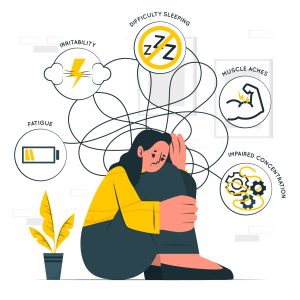Anxiety
What is Anxiety?
Anxiety is a common feeling people experience with everyday life stressors. Life stressors such as work, school, finances, or health issues may cause someone to feel worried or nervous about their ability to manage those daily tasks. If these feeling become extreme or persistent, and interfere with everyday life, an individual may be diagnosed with a generalized anxiety disorder (GAD). 1-2
According to the American Psychiatric Association, “approximately 20% of IPV survivors reported experiencing a new onset of psychiatric disorders such as major depressive disorder (MDD), generalized anxiety disorder (GAD), and posttraumatic stress disorder (PTSD) and a wide range of substance use disorders.” 3
Signs and Symptoms of Anxiety
There are several symptoms associated with anxiety. Symptoms include: 1-2, 4
- Rapid heart rate

- Shortness of breath
- Dizziness
- Muscle tension
- Feelings of nervousness
- Excessive worry
- Trouble sleeping
- Difficulty concentrating
- Irritability
It’s important to speak with your healthcare provider if you feel you’ve experienced these symptoms most days for six months or longer.
Strategies for Coping with Anxiety
If you’ve been diagnosed with GAD, your healthcare provider may recommend medication or therapy. The good news is that there are steps you can take to cope with your anxiety today. Click on the chart below for tips on coping with anxiety. 1-2, 4-5
Key Takeaways
- Anxiety is common for survivors of domestic violence.
- It is important to speak with a healthcare provider if you have experienced symptoms of anxiety that have lasted for more than six months.
- Strategies for coping with anxiety include implementing stress management techniques, joining support groups, decreasing caffeine intake, practicing good sleep habits, and engaging in activities.
